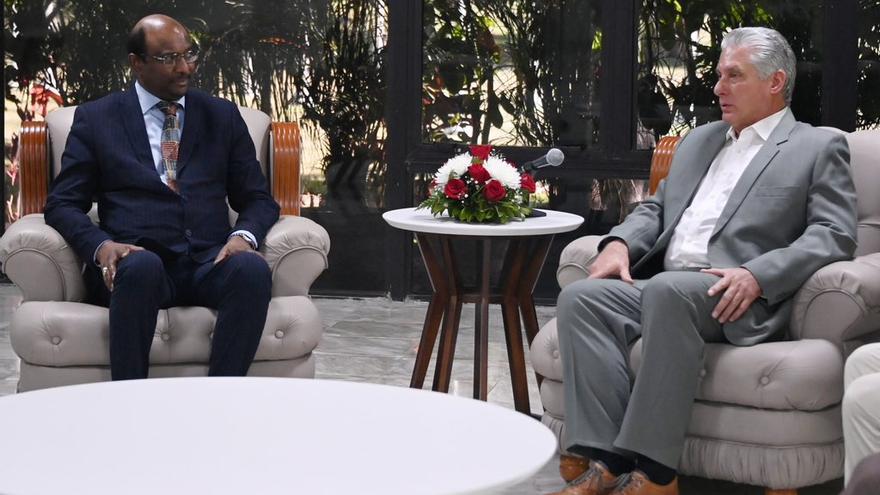
![]() 14ymedio/EFE, Havana, 19 December 2023 — Cuban President Miguel Díaz-Canel held a meeting on Monday with the secretary general of the World Council of Churches (WCC), Jerry Pillay, who is visiting Havana, he said, to “strengthen the ties” with the Christian community of the Island.
14ymedio/EFE, Havana, 19 December 2023 — Cuban President Miguel Díaz-Canel held a meeting on Monday with the secretary general of the World Council of Churches (WCC), Jerry Pillay, who is visiting Havana, he said, to “strengthen the ties” with the Christian community of the Island.
During the conversation, the religious leader reaffirmed “the support of the WCC for Cuba’s fight against the (United States) blockade,” says the Cuban Presidency on the social network X (formerly Twitter). Pillay also “rejected the inclusion of the Island in the list (prepared by the United States) of countries that allegedly sponsor terrorism,” he said.
The highest representative of the CMI gave a sermon in the First Reformed Presbyterian Church of Havana
This Sunday, on the first day of his visit, the highest representative of the CMI gave a sermon in the First Reformed Presbyterian Church of Havana, the temple where the ruling Council of Churches of Cuba was founded.
In that meeting, the Reverend highlighted the “historic ties” that unite the organization with the religious community of the Island and considered that faith in the Catholic and Protestant churches is growing in the country, according to a report by state television.
Before closing his visit this Tuesday, Pillay scheduled meetings with the board of the Cuban Council of Churches, the Reformed Presbyterian Church and representatives of ecumenical movements and religious leaders. He will also give a lecture at the San Gerónimo University College in Havana.
The international religious organization – founded 75 years ago – has 352 member churches and almost 600 million Christians in 120 countries around the world.
On the Island it has relations with the Council of Churches, which groups together almost 30 of the Christian denominations related to a greater or lesser extent to the Government, including the Pentecostals, Lutherans and Presbyterians, as well as the Salvation Army and the Quakers.
The interest of the Cuban Government in earning the support of the religious institutions of the Island has led it to meet on several occasions with religious leaders to demonstrate the support of the religious communities for the State. This is what happened last June, when Díaz-Canel traveled to the Vatican to meet with Pope Francis. In the conversation, which was expected to handle sensitive issues such as the release of political prisoners on the Island, there were only words of support for the regime from the seat of Catholicism.
Last September, the Biblical Society of the Council of Churches was constituted, with a representation of Catholics and the Greek Orthodox
Last September the Biblical Society of the Council of Churches was constituted, with a representation of Catholics and the Greek Orthodox, who were not part of the group, composed mainly of Protestant churches. During the event, in which Caridad Diego – in charge of Religious Affairs of the Communist Party – was present, the representatives of the institutions sent bibles dedicated to Raúl Castro, Díaz-Canel and Esteban Lazo.
However, not all Cuban churches have expressed their support for the Cuban Government. This is the case of the Assemblies of God, a group of evangelical churches, which on Monday published a statement denouncing the misrepresentation of information about the conflict between Israel and Palestine, by the official Cuban media.
Saying “that the barbarism of that day (October 7, when Hamas launched the first attack on Israel) was perpetrated by Israel itself exceeds the limits of rationality and the most elementary sense of justice,” they stated.
Translated by Regina Anavy
____________
COLLABORATE WITH OUR WORK: The 14ymedio team is committed to practicing serious journalism that reflects Cuba’s reality in all its depth. Thank you for joining us on this long journey. We invite you to continue supporting us by becoming a member of 14ymedio now. Together we can continue transforming journalism in Cuba.
